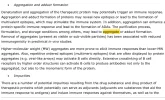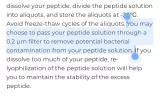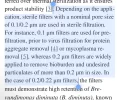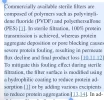Ghoul
Member
FWIW, I can tell you anecdotally, I noticed a sharp decrease in site reaction intensity from a particular peptide after filtration. Little to none vs every time with skin redness before. Others I've been in touch with say the same.
Don't want to stray into psychosomatic effects from wishful thinking of course, but "testing" this is prohibitively expensive and frankly, it's been done already numerous times by major research organizations.
To reiterate, we're looking to reduce immune reactions to aggregates, which can cause side effects, and worse, can create anti-drug antibodies that mean the peptide is less effective.
Here's the EU's stance on this, where they recognize the link, and attribute most effects to large aggregates, suggesting preventing them from developing, and filtering them out as valid ways of dealing with the problem.
Since this hasn't been updated since 2017, a lot of the "seems to be linked" statements have come much closer to yes, definitely.

Don't want to stray into psychosomatic effects from wishful thinking of course, but "testing" this is prohibitively expensive and frankly, it's been done already numerous times by major research organizations.
To reiterate, we're looking to reduce immune reactions to aggregates, which can cause side effects, and worse, can create anti-drug antibodies that mean the peptide is less effective.
Here's the EU's stance on this, where they recognize the link, and attribute most effects to large aggregates, suggesting preventing them from developing, and filtering them out as valid ways of dealing with the problem.
Since this hasn't been updated since 2017, a lot of the "seems to be linked" statements have come much closer to yes, definitely.






